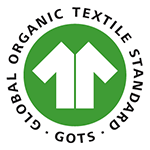GOTS Press Release - USA +++ First GOTS Regional Roundtable, Pop-Up Strengthen Global Organic Textile Standard (GOTS) Momentum

Global Organic Textile Standard (GOTS):
First GOTS Regional Roundtable, Pop-Up Strengthen Global Organic Textile Standard (GOTS) Momentum
For more information, contact:
Lori Wyman
GOTS Representative in North America
For Immediate Release
New York City (May 10, 2017)
At the May 4 “First Global Organic Textile Standard (GOTS) Regional Round Table” in North America, brand owners, executives and marketing professionals from some of the top sustainable brands that utilize certified organic cotton and organic wool, and are certified to the strict GOTS processing criteria along the entire supply chain, gathered to strategize on ways to move the organic textile industry in North America forward.
Among the topics discussed were the changes to GOTS version 5.0, which was released March 1, 2017. The new version reduced the use of Viscose and Modal to 10% (25% for sportswear and socks). Lyocell fiber made from certified organic or FSC sources may still be used up to 30%. GOTS now will allow “Combined Products” such as bassinets, car seats or furniture with upholstery fabric to have certified and labelled textile components. For social criteria, an explicit section on Ethical Business Behaviour now includes a corruption ban based on the UN Global Compact Principles.
High on the agenda was both consumer and trade education about the standard. Consumers are increasingly making the connection between the foods they eat, the clothes they wear, and the beds and bedding they sleep on, and are choosing to create an overall “organic lifestyle.” According to the North American GOTS Representative, Lori Wyman, “Now is the time for consumers to ask their favorite cotton brands whether they are certified to GOTS, and for brands to take the initiative to become certified”.
According to the Organic Trade Association (OTA), “Today's consumer is embracing an organic food-to-fashion-and-home lifestyle”. Organic food is now found in over 80 percent of American kitchens. And the American organic textile market is now a billion-dollar-plus market, posting robust double-digit growth in recent years. Organic fiber is in demand for everything from organic bath towels to baby clothes to high fashion. Consumers are increasingly looking for clean products without toxins, unnecessary ingredients, and which are produced in ways that do not harm the environment.
Ms. Wyman, also addressed attendees at the OTA’s Live Organic from Farm to Home pop-up event May 5-6 (#LiveOrganic) about the interconnections of both food and fiber when it comes to cotton and wool, among other fibers.
About GOTS: GOTS defines high level, verifiable environmental criteria throughout the entire processing chain of apparel and home textiles (including spinning, knitting, weaving, wet processing, manufacturing, and trading) made from a minimum of 70% certified organic fibers and requiring comprehensive social criteria. GOTS was developed by leading international standard setters - Organic Trade Association (U.S.), Japan Organic Cotton Association, International Association Natural Textile Industry (Germany), and Soil Association (UK) - which formed an International Working Group to define globally recognized requirements that ensure the organic status of textiles. GOTS' operating unit, the Global-Standard gemeinnützige GmbH, is a non-profit organization. For more information about GOTS see www.global-standard.org.
###
GOTS
Global Organic Textile Standard


